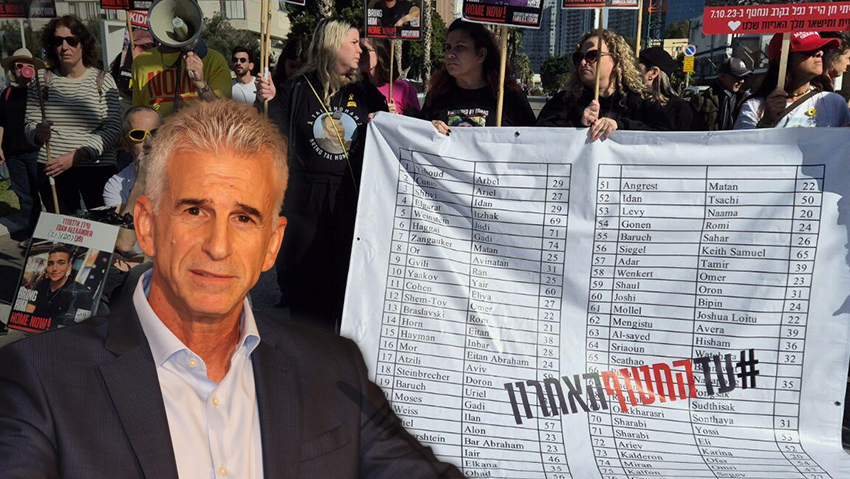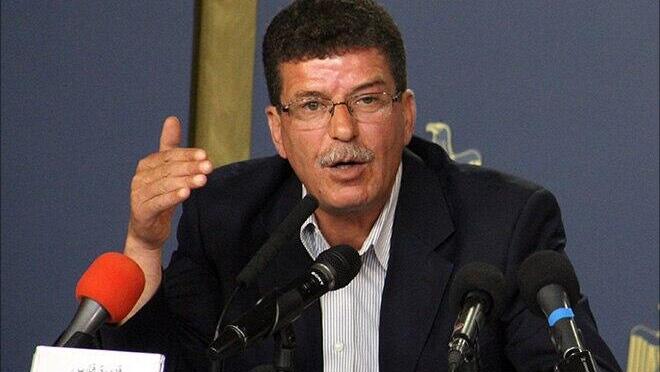Mediator Qatar has handed Israel and Hamas a "final" draft of a cease-fire and hostage release agreement designed to end the war in Gaza, an official briefed on the negotiations told Reuters on Monday. A breakthrough was reached in Doha after midnight following talks between Israel's spy chiefs, President-elect Trump's Middle East envoy and Qatar’s prime minister, the official said.
Officials in Israel denied receiving the draft and said the final agreement is dependent on Hamas. "we are very close to a deal but it is all in the hands of Hamas," an official said.
3 View gallery


Mossad chief David Barnea and a protest demanding the release of all hostages
(Photo: Ido Erez, Yariv Katz)
Sources with knowledge of the details of the deal said there are a number of outstanding matters that could determine whether an agreement is reached. "It is to do with the situation in northern Gaza, the Philadelphi corridor, the mile wide stretch along the border and the question of how many prisoners are released and who had veto power over that, including the release of convicted murderers and whether they would return home or be exiled," according to a source.
The sources said the condition of the hostages is above all considerations. "The negotiations are about all 98 hostages held by Hamas and the other Gaza factions. The first phase of the deal is in the spotlight for obvious reasons because that is the beginning of the entire process and agreement on that is near but the negotiations are over all of them, without exception," a source said. "The first phase will include the release of 33 hostages and there is a massive effort to maximize the number of live hostages in that group."
Meanwhile, Finance Minister Bezalel Smotrich said he could not support the deal. In a post on X he said the pending agreement is catastrophic for Israel's security. We will not be part of a capitulation deal that would include the release of arch-terrorists, stop the war and dissolve its achievement won in blood while sacrificing the lives of many hostages," he said in his post. "This is the time to continue in full force, conquer and purify the entire Strip and finally take control of the humanitarian aid from Hamas and open the gates of hell until Hamas is defeated and all the hostages returned."
Earlier, a Palestinian Authority source told Ynet on Monday morning that Qadura Fares, head of the Palestinian Prisoners Affairs Committee, who is responsible, among other things, for the issue of terrorists held in Israeli prisons, "went to Qatar to meet with the negotiating team and prepare the list of Palestinian prisoners who will be released as part of a hostage deal." Fares claimed Sunday that more than 3,000 Palestinian prisoners will be released in the first phase of the deal.
This could be indication of further progress in the talks to secure a cease-fire and hostage release deal. The Israeli delegation to the talks, including Mossad Chief David Barnea, Shin Bet Chief Ronen Bar and IDF representative Major General Nitzan Alon, remained in Qatar, where negotiations were underway with the participation of U.S. President Joe Biden's envoy Brett McGurk and Steve Witkoff, who is president-elect Donald Trump's Mideast envoy.
3 View gallery


US President Joe Biden and Prime Minister Benjamin Netanyahu
(Photo: Susan Walsh / AP, Prime Minister's Office)
Biden spoke to Prime Minister Benjamin Netanyahu on Sunday just eight days before the U.S. president is set to leave office. The two leaders discussed the efforts underway to reach a deal to halt the fighting in the Palestinian enclave and free the remaining hostages there, the White House said in a statement.
The Prime Minister's Office said after the call that Netanyahu briefed the president on the mandate given to the Israeli delegation to advance the release of hostages.
U.S. Vice President-elect JD Vance told Fox News Sunday in an interview taped on Saturday that he expects a deal for the release of U.S. hostages in the Middle East to be announced in the final days of the Biden administration, maybe in the last day or two.
The talks in Qatar are being held under media silence but, according to a report in the Saudi Arabian Alhadath channel, one of the main outstanding questions is to where some of the Palestinians prisoners that would be freed in exchange for the release of Israeli hostages would be exiled. Turkey and Qatar have been raised as possibilities but there were previous reports that Iran could also be an option, although it was not currently mentioned, according to the Saudi report.
J.D. Vance interview
(Fox News)
The Asharq channel in Saudi Arabia said the deal being advanced is based on the May 27 proposal and would include three stages. In the first stage 34 hostages would be released in exchange for a six-week cease-fire and 1,000 Palestinian prisoners held in Israeli jails. According to the sources quoted in the report, among them are 48 prisoners who were previously freed in the 2011 deal to release IDF soldier Gilad Shalit and were arrested again, 90 women, 150 to 200 convicted terrorists who had been sentenced to life in prison and 560 elderly or sick prisoners.
Outstanding questions in the first stage are the identity of the hostages that would be released from captivity, the withdrawal of IDF forces from populated areas, the return of displaced Gaza residents to areas they evacuated - after inspection by a third party, reopening of the Rafah border crossing to allow humanitarian aid deliveries, and removal of sick people and humanitarian cases for medical treatment outside Gaza.
The second phase would begin one week after the first and would include the release of the remaining hostages in exchange for an agreed number of Palestinian prisoners and a second six-week cease-fire. At this stage, negotiations would begin on the end of the war and an IDF withdrawal of troops.
According to the sources, the third phase would be negotiated if the second phase is agreed and that would include the rebuilding of the Gaza Strip and how it would be governed.
Get the Ynetnews app on your smartphone: Google Play: https://bit.ly/4eJ37pE | Apple App Store: https://bit.ly/3ZL7iNv
The UK-based Qatari owned Al Quds al Arabi news paper reported that agreement was reached on IDF withdrawal in the first and second phase of the deal after Hamas was given assurances that Israel would not resume fighting after completion of the deal. The paper also said the withdrawal of troops would include areas in the Netzarim Corridor and cited an official who said some of the structures built by the IDF there, were already being dismantled.
The paper also said that despite Israel's agreement to withdraw its troops, the Israeli delegation renewed its demand for control of a mile long stretch along the Gaza border with Israel.




